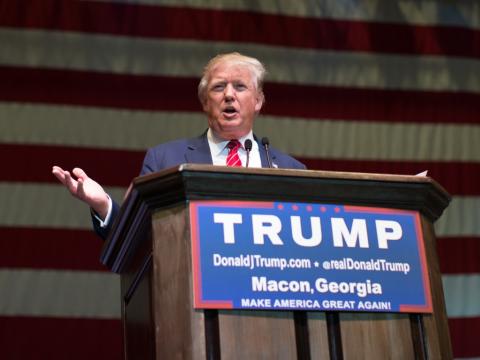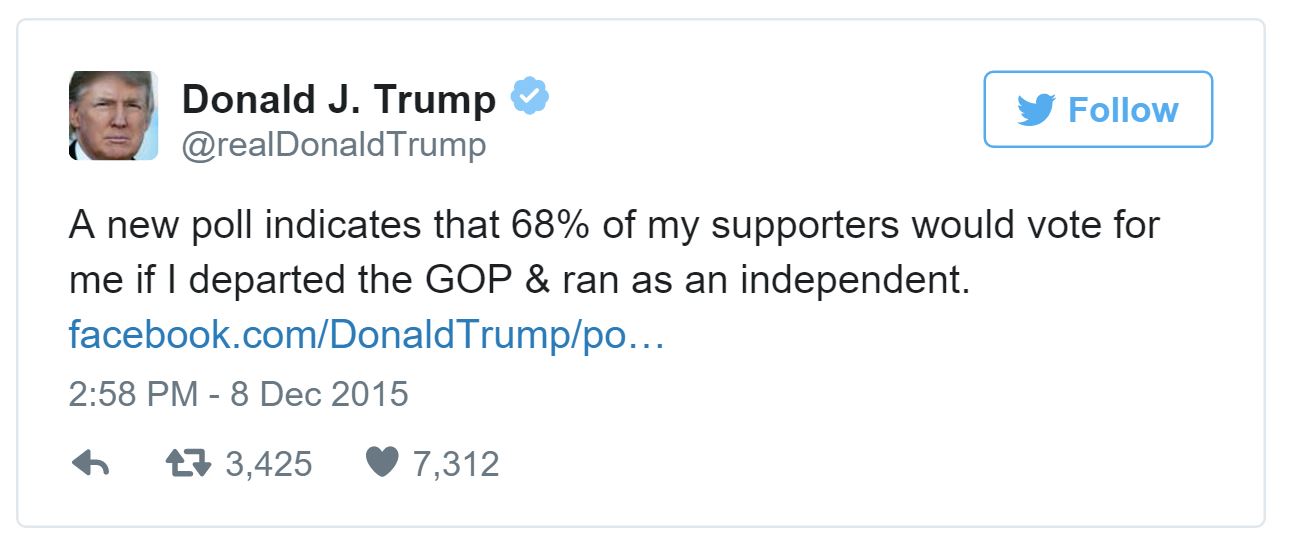The Brutal Delegate Math That Could Allow the GOP to Steal the Nomination From Trump
Republican leaders don’t want to make America great again.
Leading Republicans, including Senate Majority Leader Mitch McConnell (R-KY) and Republican National Committee Chairman Reince Priebus met Monday to discuss how the party could “lay the groundwork for a floor fight in which the GOP’s mainstream wing could coalesce around an alternative,” according to the Washington Post’s Robert Costa and Tom Hamburger. With many candidates still in the race, and Trump commanding a strong plurality — but nowhere near a majority — in the polls, it’s easy to imagine a scenario where Trump wins more primary votes than any other candidate but still lacks enough delegates to lock up the nomination. Indeed, the delegate math seems to favor the establishment.
The Party’s Rules
The GOP uses an arcane and multi-faceted method to allocate delegates to each state. Each state receives 10 at-large delegates, plus three delegates for each of the state’s congressional districts. A set number of delegates are also allocated to regions like the District of Columbia and Puerto Rico. And three party leaders from each jurisdiction are also designated as delegates.
The party’s rules then award a significant number of bonus delegates to states that supported the Republican Party’s nominee in the previous presidential election, as well as smaller bonuses to states with Republican governors, senators, House delegations and state legislative majorities. As a result, deep red states can rack up bonuses that give them delegate counts out of proportion to their population. The red state of Mississippi, a state with less than 3 million people, will send 40 delegates to the Republican National Convention. Meanwhile, the swing state of Colorado, which has nearly 5.4 million people, will only send 37 delegates to the party’s convention.
In total, 2,472 delegates will meet in Cleveland to select the party’s nominee. That means that a candidate needs 1,237 delegates (50 percent +1) in order to capture the nomination.
Trump’s biggest asset is winner-take-all states. So long as he captures a plurality of the vote in these states, he wins every delegate that is up for grabs in the state. Although the GOP’s rules require states that wish to hold a winner-take-all contest to schedule their primary or caucus no sooner than March 15, eleven states and territories will have such a contest. Additionally, a handful of states allocate some portion of their delegates to the winner of the state as a whole. In total, Trump could win about 500 delegates in states that award a bloc of delegates to the candidate who wins a plurality of the vote.
Even if Trump captures every single one of these delegates, however, he would still need to capture over 700 of the nearly 2,000 remaining delegates in order to emerge as the nominee, and here is where the math gets much more difficult for him. Even if he captures every single delegate awarded to candidates who win a plurality of the votes in a state, he would still need to win approximately 37 percent of the remaining delegates to capture the nomination — under the various and often complex rules that each state uses to allocate these delegates. Currently, the Real Clear Politics polling average shows Trump leading the GOP field with about 30 percent of the vote, so his current polls likely do not give him enough support to capture the nomination outright.
Additionally, it’s worth noting that not every delegate is “bound” to support the candidate they pledged to support prior to the convention, and the three party leaders from each state are especially likely to have the freedom to back a candidate of their own choosing. These leaders may be the most likely delegates to support an establishment coup seeking to dislodge Trump.
Wild Cards
So the math for Trump is rough, although there are a few wild cards that work in his favor. The first is that, although the GOP gives bonus delegates to states with a record of supporting Republicans, other features of the party’s nominating process give an unexpected advantage to Republicans who live in blue areas of the country.
As David Wasserman explains at Five Thirty Eight, the fact that each congressional district receives three delegates regardless of how red or blue the district may be gives a boost to Republican primary voters living in blue states that select delegates at the district level. “Three delegates are up for grabs in New York’s heavily Latino, Bronx-based 15th District,” Wasserman explains, “which cast just 5,315 votes for Romney in 2012.” Meanwhile, “there are also three delegates at stake in Alabama’s 6th District, which covers Birmingham’s whitest suburbs and gave Romney 233,803 votes.” As a result, “a GOP primary vote cast in the bluest part of the Bronx could be worth 43 times more than a vote cast in the reddest part of Alabama.”
Wasserman argues that this phenomenon puts Trump at a disadvantage, because it inflates the importance of votes cast by primary voters in more moderate regions of the country. But even if it is true that a Republican in the Bronx is more likely to hold moderate views than a Republican in Alabama, it’s not at all clear that this factor cuts against Trump. To the contrary, multiple polls have shown Trump polling strongest among self-identified moderate and liberal Republicans. A recent Quinnipiac poll, for example, showed Trump earning only 25 percent of “very conservative” Republicans, a showing that placed him four points behind conservative stalwart Sen. Ted Cruz (R-TX) among these unusually conservative voters. The same poll showed Trump earning 31 percent of “moderate” or “liberal” Republicans. So if the GOP delegate selection process gives extra say to self-described moderates, that appears to place Trump at an advantage.
And then there’s the biggest wildcard of all — rebellion. On Friday morning, Republican presidential candidate Ben Carson offered a sharp response to Republican leaders who hope to deny Trump the nomination at the convention. “If this was the beginning of a plan to subvert the will of the voters and replace it with the will of the political elite,” Carson said in a statement, “I assure you that Donald Trump will not be the only one leaving the party.” Meanwhile, Trump himself recently tweeted a message that’s hard to read as anything other than a threat to undercut the GOP presidential candidate in 2016 in the exact same way that Ralph Nader helped put George W. Bush in the White House in 2000:
That’s a mighty fine party you got there, Reince Priebus. Would be a shame if someone broke it.
Ian Millhiser is a Senior Fellow at the Center for American Progress Action Fund and the Editor of ThinkProgress Justice. Follow on Twitter @imillhiser



Spread the word